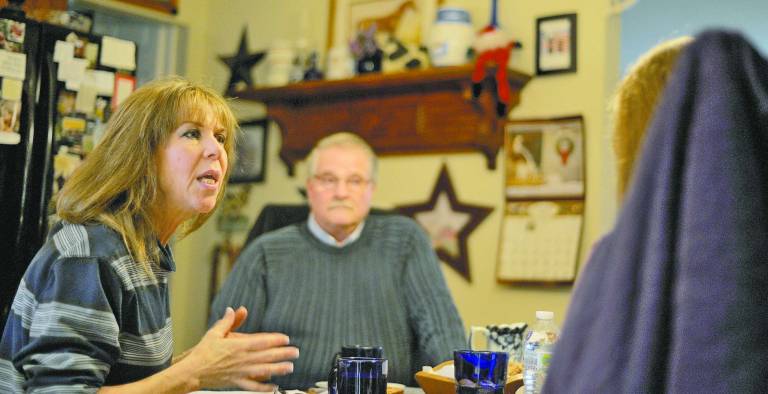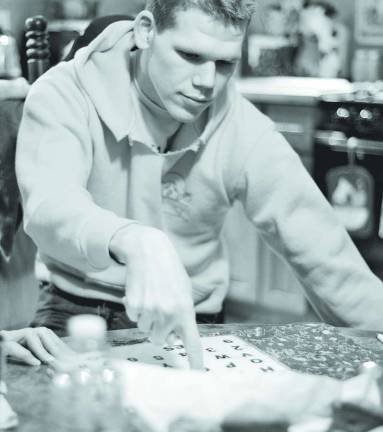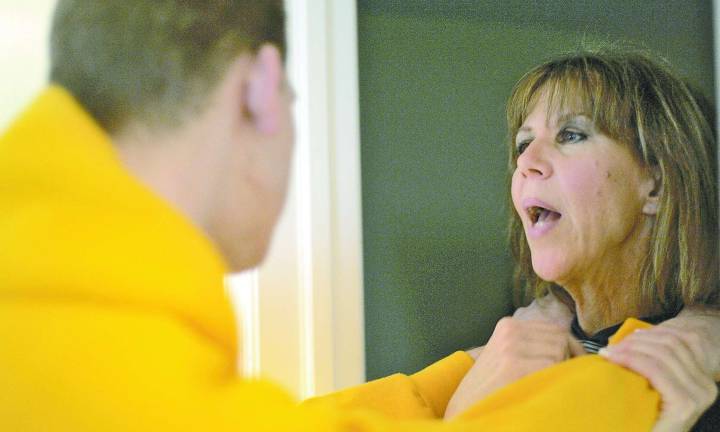Turning pain to purpose



WEST MILFORD — In life, there are consequences for all that we do. Some are good, some not so good. Some are devastating.
Maureen Morella knows too well about consequences. She and her husband, Sal, raised two articulate, bright, polite young men in Jesse and Tyler John. They are now 24 and 22 respectively. In 2004, Jesse was a junior at Pequannock High School. He was deciding whether to become an English teacher and spread his love of poetry and writing or go toward his other love, diesel mechanics. He was leaning toward teaching, said his mom.
Jesse never got that chance. On Nov. 10, 2004, Jesse made a decision that changed his life, and the lives of his family members. Jesse snorted heroin.
And his dreams of college, a career, racing his beloved ATVs and any sense of normalcy as he had known it up to this point in his 16 years, were gone.
Diligent parents
Morella describes herself as the “every mother.” She was a stay-at-home mom, a staple at her kids' school when they were growing up in Pompton Plains. She wanted all the kids in the neighborhood to hang out at her house. She welcomed them. She and her husband took seriously raising their sons. Jesse, a strapping 6 foot 2 inches with a personality that would just light up a room, taught religious education, coached the younger kids in basketball, and charmed all the adults he met.
In January 2004, Jesse confided to her that he had smoked pot. Morella recounts that as parents, she and Sal didn’t take it lightly. At all.
“Jesse was basically under house arrest,” said Morella.
They grounded him and even drug tested him the following month. When the result came back clean, they literally said “Whew, we handled that.
“We absolutely did not know that in fact he was continuing to occasionally experiment,” said Morella. “He was a productive member of our family.”
Jesse maintained his A/B average in school, worked his part-time job and never, ever came under suspicion at school, she said. He worked toward earning one night a week out, which his parents eventually granted him.
That night
Jesse came home Nov. 10, 2004 at 9 p.m., the curfew his parents had set. He told his parents he felt nauseous and dizzy. A stomach virus, they thought. He went to bed, sleeping on his back. Morella said they were alerted by hearing Jesse’s death rattles, as his body lay dying, his brain starved for oxygen. Emergency personnel came and saved Jesse’s life.
The Morellas didn’t know what had caused Jesse to get sick. They were shocked when doctors in the emergency room came back with test results showing opiates - heroin - in Jesse’s system.
“Jesse had tried heroin and his body couldn’t handle it,” said Morella.
They learned later from one of the doctors that the drug may have been cut with rat poison or had been what is called a “hot batch” - heroin so pure it kills.
Jesse remained in a coma, first at Chilton Memorial Hospital, then later at St. Joseph’s in Paterson. Doctors told Morella she should let her son go, that he would be better off rather than living in what they predicted would be a vegetative state.
Making the decision
The Morellas saw something more there in Jesse. Much more. They had to make a decision four days into this ordeal: Pull the vent and let Jesse go or continue on.
They decided to continue, Morella said, because they saw that Jesse was in there.
It’s been a fight ever since. Jesse was away from home for nearly a year, in hospitals and rehab facilities, learning how to walk again.
But the 34 minutes Jesse’s brain went without oxygen did irreparable damage. He could no longer speak or swallow. He had no control over his bodily functions. He struggled to straighten his twisted arms.
Jesse’s Journey
In 2006, with Jesse working to regain some of his physical functioning, his cousin decided to share his story with her classmates at Pope John High School. They created a slide show, depicting Jesse’s daily struggles, all because of that one choice he made back in 2004. Word got around and Morella was invited to speak throughout the area.
And she had an ally.
Dr. William Trusheim was the principal of the middle school in Pequannock when this happened and later became the superintendent. Trusheim was moved to do something after Jesse’s tragedy.
He held a Night of Hope with a panel discussion after nearly losing Jesse. A few hundred kids showed up. He instituted a random drug testing program in his district with huge approval ratings from parents.
“If you have five kids using drugs, you have a drug problem,” said Trusheim.
Morella hit the road in 2007 with Jesse’s Journey. Along with Tyler John, she found they were reaching people, kids and parents alike. But Morella felt it would be more powerful for kids to meet Jesse. She asked Jesse if he wanted to be part of the presentation and he unequivocally said yes.
“It matters,” he spelled out to his mom when she asked him why he wanted to do it.
Since then, they’ve traveled to hundreds of communities. Morella’s message is one of diligence and non-judgement. But at the same time, Morella urges parents not to indulge in making moral judgments about a child’s behavior.
“This is not about, ‘good kid-bad kid,’” she said.
Trusheim said that labeling kids can lead adults to miss signs of drug abuse, because a “good kid” can remain active and productive while abusing a drug.
Parents have to be parents and they need every tool they can get, including SROs in schools, she believes.
“We need eyes in the back of our heads,” she said.
“The point is to get kids to make a good decision, whether it’s through a positive relationship with an SRO or a teacher, or random drug testing,” said Trusheim.
Morella, who moved to West Milford three years ago, is steadfast that this is not a political issue. She simply wants to tell their story about an average family, living an average life with two incredible sons, one who made a bad decision that has changed his life forever. And his family’s.
“I want nothing to do with the political foray,” she said. “I want the opportunity to let kids meet Jesse and see the face of the child willing to experiment with drugs.”
She is motivated by helping other parents see that good kids make bad decisions. It doesn’t make them bad kids, nor does it make their parents bad parents.
What child is expendable?
Morella had the option back in 2004 to let this all slip quietly away. Medical professionals said it could be officially explained as a stroke or heart problem.
But that’s not Maureen Morella. She wouldn’t hear of it. Even though she knew she and her husband would be judged as parents, she didn’t see the purpose in hiding it.
“And I’m not judging any other parents who make that choice,” she said. “Who am I helping by lying about this? When I became a mother, I became a mother to every kid that crosses my path. What child is expendable?”
None, as far as Morella and Trusheim are concerned.
“I’m not excusing what Jesse did. I'm not condoning what Jesse did. I'm not justifying what he did,” said Morella. “My fear is if this could happen to us, it could happen to anyone.”
Morella has been invited to speak to the high school students in West Milford. On Tuesday morning, Jan. 8, 2013 she, Tyler John and Jesse will present Jesse’s Journey at two assemblies. On Thursday evening, Jan. 10, 2013, she will address parents.
Morella said, “Let’s be the community known for coming together and fighting this, without blaming each other.”
What are your thoughts about Jesse’s Journey and Maureen Morella’s mission? Go to westmilfordmessenger.com and tell us your thoughts.